History
Bethel University
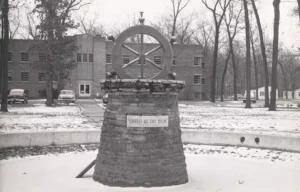 For more than 70 years, Bethel University has been educating students with the same mission. Though many things have changed since the college first opened in 1947, the Christ-centered, academically challenging focus has remained steadfast.
For more than 70 years, Bethel University has been educating students with the same mission. Though many things have changed since the college first opened in 1947, the Christ-centered, academically challenging focus has remained steadfast.
Institutional Profile
Currently composed of about 1,450 traditional and adult and graduate students from 27 states and every continent except the poles, and 187 full-time employees, Bethel University is in a city of 250,000 residents (Mishawaka), five colleges (including, nearby, the University of Notre Dame, Indiana University South Bend, Ivy Tech Community College-South Bend, Holy Cross College, Saint Mary’s College), the second largest shopping district in the state of Indiana, 15,000 businesses, 50 parks, and Mishawaka’s own renovated, three-mile Riverwalk development. Resort venues on Lake Michigan are 45 minutes away.
Read our full profile.
Our Founders
The roots of Bethel University run deep. Mennonite Brethren in Christ (MBC) founder Daniel Brenneman first called for a training institute in 1893. Then, for many years, J. A. Huffman pressed the case for a Christian liberal arts college, even suggesting the name Bethel, meaning “house of God.” Formal church approval finally came in 1944, and land was purchased in Mishawaka, Ind., in 1946 under the leadership of Q. J. Everest, Seth Rohrer, and Warren Manges. Twenty-seven-year-old Woodrow I. Goodman was appointed the first president (1947-1959), at that time the youngest in the United States.
About the Missionary Church
The Missionary Church, Inc. (est. 1969)
The Missionary Church (MC), headquartered in Ft. Wayne, Ind., grew from the 1968-1969 merger of the Missionary Church Association (MCA) and the United Missionary Church (UMC) (formerly the Mennonite Brethren in Christ). The MCA had roots in the “Egly Amish” and the “German Branch” of the Christian & Missionary Alliance, while the UMC drew from a spectrum of Mennonite groups and the “River Brethren” of Ohio (“Swankites”) and embraced Canadian districts. Both sides shared an Anabaptist history influenced by Pietist, Wesleyan-Holiness and Keswickian-Holiness movements, including the fourfold gospel preached by A. B. Simpson: Jesus Christ as Savior, Sanctifier, Healer and Coming King. By the time of the merger, both were active in the National Association of Evangelicals; earlier trademarks such as the peace witness and women in ministry had faded, while elements of fundamentalism emerged. Believer’s baptism by immersion remains important; church polity is a modified congregationalism. The MCA had been more centralized nationally, the UMC more district oriented. Both found great meaning in camps and revival meetings. As the names suggest, overseas missions were a driving motivation and a means of self-definition: missions and evangelism prepared the way for the imminent return of Christ (Mt. 24:14 & Mk. 13:10). Kenneth E. Geiger, former UMC general superintendent and National Holiness Association president, became the first MC president (1969-1981), followed by Leonard DeWitt (1981-1987) and John Moran (1987-). The theological tilt is still generally Wesleyan-Arminian.
The merger saw some 273 local congregations come together, with 17,700 members, some 25,500 in Sunday worship, and a constituency of 35,500, with a congregational average of 93 members. Most U.S. members were located in Indiana, Michigan, Ohio and California. Growth came slowly and was offset by the loss of the Canadian churches when they formed the Missionary Church of Canada in 1987 (then merged with the Evangelical Church of Canada in 1993 to become the Evangelical Missionary Church of Canada). But an aggressive pattern of church growth and church planting in the 1990s led by the end of 1998 to over 340 congregations with 31,600+ members, 47,500+ in Sunday worship, a constituency of 72,000 and a congregational average of 139 members. One-third of current congregations are less than nine years old, over a third of the new churches represent a non-European ethnic heritage and there is a renewed vision for urban ministries. New districts include Puerto Rico and Texas, with systematic coverage of the U.S. planned. Vibrant worship services in younger congregations reflect a move toward contemporary styles of music and praise. The Church Multiplication Training Center has in a few short years gone from a Western District project to serving over 80 denominations.
At the merger, missionary outreaches were maintained in Nigeria, India, Sierra Leone, Ecuador, Dominican Republic, Jamaica, Haiti, Brazil, Mexico and Cyprus, each with its own unique history and pattern of church-mission-church relations. National churches are autonomous members of the International Fellowship of Missionary Churches. France (1979) and Spain (1985) saw new approaches, then were followed in the 1990s by missionary thrusts into Kurdish areas (various countries), Indonesia, Thailand, Portugal, Russia, Arab nations, Viet Nam, Guinea, China, Cuba, Chad, Venezuela, South Africa and Germany. Some national churches experienced spectacular growth (Nigeria exceeds the U.S.), and several maintain notable training centers (e.g., Jamaica Theological Seminary). Numerous missionaries have also served under other agencies, often in other countries where there is no official Missionary Church presence.
Not every aspect of the merger went smoothly. Bethel Publishing expanded rapidly and entered the retail market, then collapsed, ceasing both publishing and retail store operations in 1998. The two historic central districts were gerrymandered rather than merged and remained fiercely loyal to their respective colleges, Fort Wayne Bible College and Bethel College, Mishawaka, Indiana. Each school struggled and nearly closed. FWBC, after a brief hiatus as Summit Christian College (1989-1992), finally severed formal ties to the MC and merged with Taylor University, Upland, IN, becoming its second campus. Bethel College, down to 89 resident students (spring 1986) and facing bankruptcy, has instead enjoyed a spectacular renaissance and since gained repeated national recognition for religious revival, rapid growth, aggressive administration, academic innovation, artistic performance and athletic prowess. In some ways Bethel College embodies the current MC denominational trends toward higher visibility and transformed identity, but the college has simultaneously become a center for the recovery of denominational history and heritage.
Bibliography
- Erdel, Timothy Paul. “The Missionary Church: From Radical Outcast to the Wild Child of Anabaptism.” Illinois Mennonite Heritage, September 1997, 60, 59.
- Engbrecht, Dennis. “Marriage, Memory, and Mission: On the 25th Anniversary of the MCA/UMC Merger.” Emphasis on Faith and Living, July/August 1994, 4, 13.
- Lageer, Eileen. Merging Streams: Story of the Missionary Church. Elkhart, IN: Bethel Publishing Co., 1979.
- “The First Quarter Century” [Special double issue]. Reflections: A Publication of the Missionary Church Historical Society 2-3 (Fall 1994/Spring 1995).
- Emphasis on Faith and Living. Elkhart and Ft. Wayne, IN: 1969-.
- World Partners. Ft. Wayne, Ind.: 1992-1996.
- Missionary Church Archives, Bethel College, IN
Through the Years
Events Through the Decades
1940s
Bethel College opened in the fall of 1947 with 94 students. During that same year, the Mennonite Brethren in Christ (MBC) became the United Missionary Church. The Administration Building was completed in 1951, the first of many projects dependent upon sacrificial giving and volunteer labor.
1950s
Bethel established some 11 academic programs during its first decade, capped by the Teacher Education Program in 1955. Intercollegiate athletic programs were approved in 1958, with the first intercollegiate basketball game played in 1959.
1970s – 1980s
On March 31, 1971, President Ray P. Pannabecker (1959-1974) and Dean Wayne J. Gerber welcomed North Central Association accreditation. Bethel College grew steadily until it reached an enrollment of about 500. The college flourished because of what President Steven R. Cramer has called its “human endowment” — an extremely loyal, faithful and hard-working faculty, staff, administration and Board of Trustees.
Bethel College continued moving forward under the presidencies of Albert J. Beutler (1974-1981), James A. Bennett (1982-1988), and Walter L. Weldy (interim 1988-1989). Among the more notable additions and innovations were the adult programs, the division of nursing and the Otis Bowen Library, which anchored a new architectural style. In 1986, the baseball team won the first of what would become over 50 team national championships.
1989-2004
Bethel experienced a remarkable renaissance under the presidency of Norman V. Bridges (1989-2004). A dynamic team of administrators, repeated record enrollments, greatly expanded curricular offerings, the hiring of nationally known scholars, an aggressive, aesthetically attractive plan of campus development, and notable periods of spiritual renewal have helped make Bethel College a school of choice for many from the region.
In addition to a burgeoning traditional student body, adult and graduate degree programs have helped fuel the growth of the college. With notable new majors in Sign Language Interpreting, Environmental Biology, Criminal Justice, Philosophy and Spanish complementing traditional strengths in Music, Theatre, Religion, Business and the service professions, Bethel College increasingly reflects a national and international student body. The college also participates in a broad range of study abroad programs and annually sends out dozens of students on Task Force ministry teams around the world.
Dr. Steven R. Cramer was inaugurated in 2004 as the sixth president of Bethel College, and his tenure extended the pattern of strong, progressive leadership. During his presidency, the music department received NASM accreditation, and the campus became more intentional in its multi-ethnic programming. Senior administrators worked to secure the long-term financial future of Bethel during a period of national economic crisis. Dr. Dennis D. Engbrecht continued as Senior Vice President.
A $6.9 million addition to the Middleton Hall of Science is just one in a long string of major construction and landscaping projects since the early 1990s, including Founders Village Apartments, the Middleton wing for Nursing, an enlarged Dining Commons, the Everest-Rohrer Chapel/Fine Arts Center, Wiekamp Athletic Center, Shiloh Prayer Chapel, the campus ponds and waterfall, Morey Soccer Field, Taylor Memorial Chapel, Jenkins Stadium, Sailor Residential Center, Miller/Moore Academic Center, Campus Store and a new west campus entrance and a renovated Helm. A series of land acquisitions have shattered the myth that the main campus is landlocked. The Elkhart campus and the nursing program at Grace College are two of several emerging extension centers for Bethel.
2013
With the appointment of Dr. Gregg Chenoweth as the new president in 2013, Bethel College stands on the threshold of a new era but does so deeply rooted in a past sustained by faith. “Forward, with Christ at the Helm.”
2019
Bethel College becomes Bethel University on May 6.
2020
Over 40 athletic team national championships.
Presidents
Bethel University opened its doors to students in the fall of 1947, with 93 students enrolled. The office of the president continues to be a place where vision, growth and spiritual revival are the focus – all for the greater glory of God. This list highlights and honors all the presidents of Bethel.
Current President: Barb Bellefeuille, Ed.D.
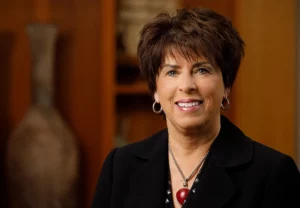
Learn More About Our Current President
Past Presidents
The Rev. Woodrow I. Goodman, D.D., Lit.D. (1918–2004)
Presidential term: 1947-1959
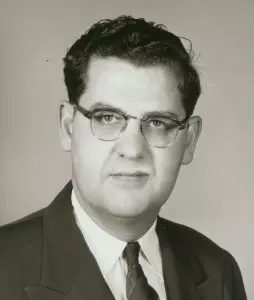 When the doors to Bethel College opened in the fall of 1947, 27-year-old Woodrow I. Goodman, M.A. (Wheaton College), was the youngest college president in the United States. Under his watch, enrollment grew from 93 to 329 students. One of his priorities was the establishment of a department of education, and he also worked with the United Missionary Church to facilitate a campus development program that reached $1 million by 1959. Construction projects during his tenure included the all-purpose Huffman Administration building, an early science hall, the Helm, a gymnasium-auditorium (later named for him), and Shupe Residence Hall. Goodman was honored for his pioneering leadership by Taylor University (D.D., 1952), Houghton College (Lit.D., 1956), and Wheaton College. He later accepted the presidency of Marion College (today Indiana Wesleyan University), serving from 1960-1976. Goodman was known by Bethel students in the ’50s as “The Working President” since he worked alongside students in the construction of a number of campus projects. His memoirs were published in 1992 as Bridge over the Valley. He was 86 when he died in Upland, California.
When the doors to Bethel College opened in the fall of 1947, 27-year-old Woodrow I. Goodman, M.A. (Wheaton College), was the youngest college president in the United States. Under his watch, enrollment grew from 93 to 329 students. One of his priorities was the establishment of a department of education, and he also worked with the United Missionary Church to facilitate a campus development program that reached $1 million by 1959. Construction projects during his tenure included the all-purpose Huffman Administration building, an early science hall, the Helm, a gymnasium-auditorium (later named for him), and Shupe Residence Hall. Goodman was honored for his pioneering leadership by Taylor University (D.D., 1952), Houghton College (Lit.D., 1956), and Wheaton College. He later accepted the presidency of Marion College (today Indiana Wesleyan University), serving from 1960-1976. Goodman was known by Bethel students in the ’50s as “The Working President” since he worked alongside students in the construction of a number of campus projects. His memoirs were published in 1992 as Bridge over the Valley. He was 86 when he died in Upland, California.
The Rev. Ray Plowman Pannabecker, D.D. (1913–2001)
Presidential term: 1959-1974
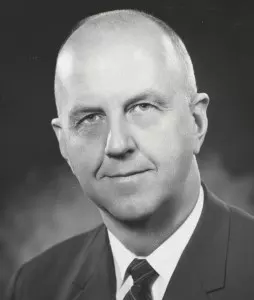 The Rev. Ray P. Pannabecker became the second president of Bethel College. A former pastor, he began at Bethel as its first business manager while also teaching Bible, public speaking, and social studies. Before he took on the role of president in 1959, he served the Missionary Church as a district superintendent and editor of the denomination’s publication, The Gospel Banner. As Bethel’s president, Pannabecker acquired 27 additional acres and built the Middleton Hall of Science, the Oakwood-Slater Residence Hall, and a maintenance building. Pannabecker also ushered in Bethel’s intercollegiate athletic programs. In 1970, a revival sparked by the Holy Spirit moved students to pray in the auditorium for hours. The next year the college achieved full accreditation by the North Central Association of Colleges and Secondary Schools. Pannabecker handed out 1,201 diplomas to graduates during his tenure. A friend to all on campus and many across Michiana, he visited Missionary Church congregations frequently with student Gospel Teams. Asbury Theological Seminary awarded him the Doctor of Divinity in 1964. Upon leaving office, he was named president emeritus; he then became the first director of services at the Missionary Church Headquarters in Fort Wayne, Indiana. He was also instrumental in the founding and development of Hubbard Hill Retirement Community and became its chaplain. He died in Elkhart, Indiana, at age 87.
The Rev. Ray P. Pannabecker became the second president of Bethel College. A former pastor, he began at Bethel as its first business manager while also teaching Bible, public speaking, and social studies. Before he took on the role of president in 1959, he served the Missionary Church as a district superintendent and editor of the denomination’s publication, The Gospel Banner. As Bethel’s president, Pannabecker acquired 27 additional acres and built the Middleton Hall of Science, the Oakwood-Slater Residence Hall, and a maintenance building. Pannabecker also ushered in Bethel’s intercollegiate athletic programs. In 1970, a revival sparked by the Holy Spirit moved students to pray in the auditorium for hours. The next year the college achieved full accreditation by the North Central Association of Colleges and Secondary Schools. Pannabecker handed out 1,201 diplomas to graduates during his tenure. A friend to all on campus and many across Michiana, he visited Missionary Church congregations frequently with student Gospel Teams. Asbury Theological Seminary awarded him the Doctor of Divinity in 1964. Upon leaving office, he was named president emeritus; he then became the first director of services at the Missionary Church Headquarters in Fort Wayne, Indiana. He was also instrumental in the founding and development of Hubbard Hill Retirement Community and became its chaplain. He died in Elkhart, Indiana, at age 87.
The Rev. Albert J. Beutler, Ph.D. (1929–2018)
Presidential term: 1974-1982
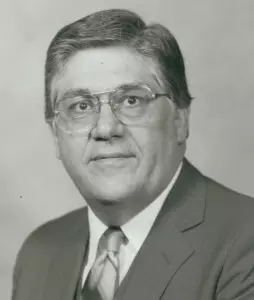 The Rev. Albert J. Beutler, Ph.D. (Michigan State University), was the first alumnus to serve as president of Bethel College, but before taking that role he held other positions both on campus and in the community. Beutler came to Bethel in 1947 with the inaugural freshman class and graduated in 1951 with a degree in Biblical Literature and Psychology. Immediately following graduation, he became Bethel’s dean of students and dean of men. In 1958, he became the school’s first men’s basketball coach. In 1966, he became Bethel’s first Alumnus of the Year after leaving Bethel to become the dean of student services at Indiana University in South Bend. He would later return to Bethel to serve as the third president. Beutler is credited with constructing the Dining Commons and the Eastwood Apartments. In addition, he is responsible for eliminating operational debt, increasing assets by 60 percent, creating an associate’s degree with 11 concentration areas and a master’s degree in Christian education, as well as continuing Bethel’s good rapport with the broader community. His doctoral dissertation recounts the early years of the school: “The Founding and History of Bethel College of Indiana.” Beutler was twice named “Sagamore of the Wabash,” first by Indiana governor Otis R. Bowen in 1979 and then by Governor Robert D. Orr in 1985; he later became an administrator at Saginaw Valley State University in Michigan.
The Rev. Albert J. Beutler, Ph.D. (Michigan State University), was the first alumnus to serve as president of Bethel College, but before taking that role he held other positions both on campus and in the community. Beutler came to Bethel in 1947 with the inaugural freshman class and graduated in 1951 with a degree in Biblical Literature and Psychology. Immediately following graduation, he became Bethel’s dean of students and dean of men. In 1958, he became the school’s first men’s basketball coach. In 1966, he became Bethel’s first Alumnus of the Year after leaving Bethel to become the dean of student services at Indiana University in South Bend. He would later return to Bethel to serve as the third president. Beutler is credited with constructing the Dining Commons and the Eastwood Apartments. In addition, he is responsible for eliminating operational debt, increasing assets by 60 percent, creating an associate’s degree with 11 concentration areas and a master’s degree in Christian education, as well as continuing Bethel’s good rapport with the broader community. His doctoral dissertation recounts the early years of the school: “The Founding and History of Bethel College of Indiana.” Beutler was twice named “Sagamore of the Wabash,” first by Indiana governor Otis R. Bowen in 1979 and then by Governor Robert D. Orr in 1985; he later became an administrator at Saginaw Valley State University in Michigan.
The Rev. James A. Bennett, Ph.D. (1937– 2015)
Presidential term: 1982-1988
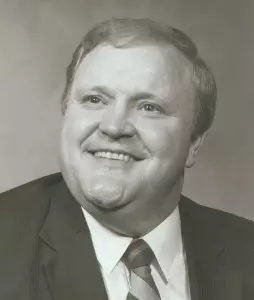 James Allen Bennett, Ph.D. (Walden University), was Bethel’s fourth president, serving the school faithfully for six years during a particularly challenging era. A 1961 graduate of Bethel with a degree in Theology, Bennett was a member of Bethel’s board of directors from 1975 to 1980, serving as chair the last two. Then he was hired as Bethel’s director of institutional advancement in 1980. The Otis and Elizabeth Bowen Library was built under his leadership, the first building on campus with a distinctive new architectural style. He also enlarged the scope of the academic programs to meet the changing needs of the church and community, initiating nursing, master of ministries, and adult college programs for returning students. In 1986, the baseball team won the NCCAA I tournament, which was the first in a flood of national titles for Bethel College sports teams. After leaving the presidency, Bennett re-entered the pastoral ministry and helped further develop Prairie Camp. He passed away on Oct. 8, 2015, after years of declining health. He was 78 years old.
James Allen Bennett, Ph.D. (Walden University), was Bethel’s fourth president, serving the school faithfully for six years during a particularly challenging era. A 1961 graduate of Bethel with a degree in Theology, Bennett was a member of Bethel’s board of directors from 1975 to 1980, serving as chair the last two. Then he was hired as Bethel’s director of institutional advancement in 1980. The Otis and Elizabeth Bowen Library was built under his leadership, the first building on campus with a distinctive new architectural style. He also enlarged the scope of the academic programs to meet the changing needs of the church and community, initiating nursing, master of ministries, and adult college programs for returning students. In 1986, the baseball team won the NCCAA I tournament, which was the first in a flood of national titles for Bethel College sports teams. After leaving the presidency, Bennett re-entered the pastoral ministry and helped further develop Prairie Camp. He passed away on Oct. 8, 2015, after years of declining health. He was 78 years old.
Walter L. Weldy (1940–)
Presidential term: 1988-1989
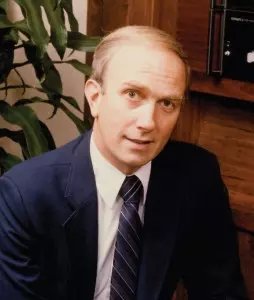 A banker by profession, Walt L. Weldy gave invaluable guidance to Bethel as an interim president for one year during a period of financial duress. He had previously served on the Bethel board of directors in the early 1970s and as the board treasurer. While serving as president, he maintained his private business and financial consulting firm in Wakarusa. Weldy was a firm believer that Bethel’s central purpose was to teach, train, promote, and protect time-tested values such as faith in God and commitment toward family, community, church, and country. His first action was to move the college toward a more solid financial foundation. In addition, he made sure the school’s business and administrative obligations were met until a new president could be found.
A banker by profession, Walt L. Weldy gave invaluable guidance to Bethel as an interim president for one year during a period of financial duress. He had previously served on the Bethel board of directors in the early 1970s and as the board treasurer. While serving as president, he maintained his private business and financial consulting firm in Wakarusa. Weldy was a firm believer that Bethel’s central purpose was to teach, train, promote, and protect time-tested values such as faith in God and commitment toward family, community, church, and country. His first action was to move the college toward a more solid financial foundation. In addition, he made sure the school’s business and administrative obligations were met until a new president could be found.
Norman V. Bridges, Ph.D. (1938–2010)
Presidential term: 1989-2004
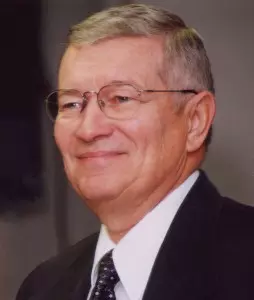 Norman V. Bridges, Ph.D. (University of Michigan), guided Bethel College from a well-kept secret to national recognition during his presidency. He graduated from Bethel with a B.A. in English Education magna cum laude in 1960, returning next to serve variously as dean of students, professor of history and education, and as vice president for administration (1966-1976). He was named Alumnus of the Year in 1975. As president, Bridges increased the annual operating budget from under $3 million to approximately $30 million. The school more than tripled in enrollment to some 1,850 students. More than 40 academic programs were added, with innovative majors such as sign language interpreting. The rising academic reputation boosted Bethel from fourth- to first-tier rankings in U.S. News & World Report. Lasting changes occurred during periods of intense revival in 1991 and 1994. Landmark building projects included Founders Village, the Davidhizar Nursing Wing, the Dining Commons addition, the Everest-Rohrer Chapel/Fine Arts Center, the Taylor Memorial Chapel, the Shiloh Prayer Chapel, the Wiekamp Athletic Center, the Sailor Residential Center, the Miller/Moore Academic Center, the Jenkins Baseball Stadium, the Morey Soccer Field, and the Bethel bookstore. Upon retiring from Bethel, Bridges was cascaded with honors, from the first Festschrift (volume of writings) ever compiled for a Bethel academic, to “Sagamore of the Wabash” by Governor Joe Kernan of Indiana, to president emeritus of Bethel. He passed away at the age of 72 in Mishawaka, Indiana.
Norman V. Bridges, Ph.D. (University of Michigan), guided Bethel College from a well-kept secret to national recognition during his presidency. He graduated from Bethel with a B.A. in English Education magna cum laude in 1960, returning next to serve variously as dean of students, professor of history and education, and as vice president for administration (1966-1976). He was named Alumnus of the Year in 1975. As president, Bridges increased the annual operating budget from under $3 million to approximately $30 million. The school more than tripled in enrollment to some 1,850 students. More than 40 academic programs were added, with innovative majors such as sign language interpreting. The rising academic reputation boosted Bethel from fourth- to first-tier rankings in U.S. News & World Report. Lasting changes occurred during periods of intense revival in 1991 and 1994. Landmark building projects included Founders Village, the Davidhizar Nursing Wing, the Dining Commons addition, the Everest-Rohrer Chapel/Fine Arts Center, the Taylor Memorial Chapel, the Shiloh Prayer Chapel, the Wiekamp Athletic Center, the Sailor Residential Center, the Miller/Moore Academic Center, the Jenkins Baseball Stadium, the Morey Soccer Field, and the Bethel bookstore. Upon retiring from Bethel, Bridges was cascaded with honors, from the first Festschrift (volume of writings) ever compiled for a Bethel academic, to “Sagamore of the Wabash” by Governor Joe Kernan of Indiana, to president emeritus of Bethel. He passed away at the age of 72 in Mishawaka, Indiana.
Steven R. Cramer, Ph.D. (1950–)
Presidential term: 2004-2013
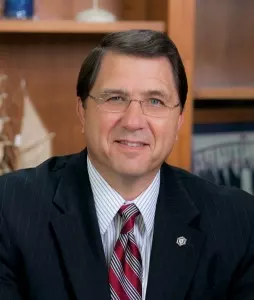 Steven R. Cramer, Ph.D. (Indiana State University), was inaugurated as Bethel’s sixth president in 2004. A 1975 Bethel graduate in music and its 2002 Alumnus of the Year, he worked for Bethel in admissions from 1973-1975, in church relations from 1982-1985, and then returned once more in 1987 as Bethel’s vice president for institutional advancement. He served 17 years in that role, designing and implementing five fundraising campaigns totaling more than $50 million. During his presidency, enrollment continued to climb to more than 2,100 students, as Bethel continued to rise in its ranking of the Midwest’s Best Baccalaureate Colleges by U.S. News & World Report. Bethel’s study abroad offerings were expanded; the music department received NASM accreditation; and the campus became more intentional in its multi-ethnic programming. Cramer worked to secure the long-term financial future of Bethel during a period of national economic crisis. Despite that, the college moved forward with multiple building projects, including the Pannabecker Math and Science Laboratories, a new west campus entrance and a renovated Helm, Bridges Residence Hall, a renovated dining commons, and an enlarged college bookstore/coffee shop. The campus borders were expanded with the purchase of 13 acres to the south. There were several firsts during this time: the appointment of the first two female vice presidents, the launch of online degree programs, a visit from a sitting U.S. President (George W. Bush) and the hosting of the Missionary Church General Conference.
Steven R. Cramer, Ph.D. (Indiana State University), was inaugurated as Bethel’s sixth president in 2004. A 1975 Bethel graduate in music and its 2002 Alumnus of the Year, he worked for Bethel in admissions from 1973-1975, in church relations from 1982-1985, and then returned once more in 1987 as Bethel’s vice president for institutional advancement. He served 17 years in that role, designing and implementing five fundraising campaigns totaling more than $50 million. During his presidency, enrollment continued to climb to more than 2,100 students, as Bethel continued to rise in its ranking of the Midwest’s Best Baccalaureate Colleges by U.S. News & World Report. Bethel’s study abroad offerings were expanded; the music department received NASM accreditation; and the campus became more intentional in its multi-ethnic programming. Cramer worked to secure the long-term financial future of Bethel during a period of national economic crisis. Despite that, the college moved forward with multiple building projects, including the Pannabecker Math and Science Laboratories, a new west campus entrance and a renovated Helm, Bridges Residence Hall, a renovated dining commons, and an enlarged college bookstore/coffee shop. The campus borders were expanded with the purchase of 13 acres to the south. There were several firsts during this time: the appointment of the first two female vice presidents, the launch of online degree programs, a visit from a sitting U.S. President (George W. Bush) and the hosting of the Missionary Church General Conference.
Gregg A. Chenoweth, Ph.D. (1968–)
Presidential term: 2013-2021
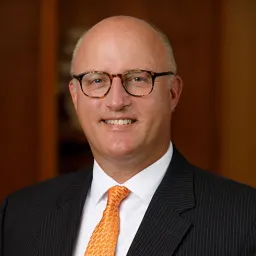 Gregg Chenoweth began his tenure as Bethel University’s president on July 8, 2013, having most recently served as vice president for academic affairs at Olivet Nazarene University in Bourbonnais, Ill. In his first five years at Bethel, Chenoweth worked with colleagues to complete a five-year focus on five institutional priorities titled, the GREATer Agenda. In 2018, the Board unanimously approved his proposal for the GROW Agenda, 2018-2022. It focused on expanding college access through additional athletic programs and facilities, developing more sophisticated digital marketing and customized financial aid, doubling the number of online undergraduate and graduate programs and more.
Gregg Chenoweth began his tenure as Bethel University’s president on July 8, 2013, having most recently served as vice president for academic affairs at Olivet Nazarene University in Bourbonnais, Ill. In his first five years at Bethel, Chenoweth worked with colleagues to complete a five-year focus on five institutional priorities titled, the GREATer Agenda. In 2018, the Board unanimously approved his proposal for the GROW Agenda, 2018-2022. It focused on expanding college access through additional athletic programs and facilities, developing more sophisticated digital marketing and customized financial aid, doubling the number of online undergraduate and graduate programs and more.
Emeritus
2023Following is a list of individuals of outstanding merit who were named emeritus at Bethel College.
| Name | Birth-Death | Role |
|---|---|---|
| Jacob Bawa Salka | 1935-2022 | Honorary Visiting Professor: Religion |
| Otis R. Bowen | 1918-2013 | Honorary Trustee |
| Norman V. Bridges | 1938-2010 | President Emeritus |
| Donald L. Conrad | 1926-2017 | Professor Emeritus: Sociology |
| Steven Ross Cramer | 1950- | President Emeritus |
| Ruth E. Davidhizar | 1946-2008 | Dean of Nursing Emeritus |
| C. Emmet Eiler |
1902-1979
|
Associate Professor Emeritus: Education |
| Dennis Dean Engbrecht | 1949- | Senior Vice President Emeritus |
| Marvin E. Engbrecht | 1922-2018 | Trustee Emeritus |
| Quinton J. Everest | 1907-2005 | Trustee Emeritus |
| Richard E. Felix | 1938– | Trustee Emeritus |
| Wayne J. Gerber | 1927-2023 | Dean Emeritus |
| Charles E. Habegger | 1930- | Trustee Emeritus |
| Robert N. Ham | 1954-2016 | Associate Professor Emeritus: Music |
| Ralph C. Holdeman | 1921-1986 | Trustee Emeritus |
| Michael L. Holtgren | 1942- | Vice President Emeritus |
| Elizabeth “Liz” Ann Hossler | 1954-2008 | Professor Emeritus: Psychology |
| Horace E. Hossler | 1915-2004 | Trustee Emeritus |
| Jasper Abraham Huffman | 1880-1970 | Dean Emeritus |
| Joseph H. Kimbel | 1913-2005 | Trustee Emeritus |
| James L. Kroon | 1926-2015 | Professor Emeritus: Chemistry |
| Ora D. Lovell | 1914-2008 | Associate Professor Emeritus: Bible |
| Lois L. Luesing | 1933-2023 | Librarian Emerita: Archives |
| Lowry Mallory | 1923-2016 | Professor Emeritus: History |
| Glen E. Musselman | 1931-2021 | Trustee Emeritus |
| Elliott A. Nordgren | 1933- | Professor Emeritus: Music |
| Ray P. Pannabecker | 1913-2001 | President Emeritus |
| E. Kathryn Paschall | 1924-2013 | Emerita Library |
| Bruce W. Pearson | 1919-2009 | Trustee Emeritus |
| Earl A. Reimer | 1936-2007 | Professor Emeritus: English/Theatre |
| Kenneth L. Robinson | 1912-1998 | Professor Emeritus: English |
| Seth A. Rohrer | 1909-2005 | Trustee Emeritus |
| Clyde R. Root | 1944-2024 | Library Director Emeritus |
| Vernon R. Sailor | 1926-2007 | Trustee Emeritus |
| Bernice E. Schultz-Pettifor | 1935- | Professor Emerita: Education |
| Evelyn R. Slavik | 1922-1994 | Associate Professor Emerita: English |
| John M. Smith | 1931- 2022 | Professor Emeritus: Biology |
| Howard H. Steele | 1914-2007 | Trustee Emeritus |
| Charles W. Taylor | 1909-1996 | Professor Emeritus: Social Sciences |
| Stanley M. Taylor | 1916-2011 | Professor Emeritus: Education |
| John E. Tuckey | 1910-2007 | Trustee Emeritus |
| Raymond M. Weaver | 1906-1991 | Associate Professor Emeritus: Music |
| William E. White | 1928-2008 | Trustee Emeritus |
| Ancel L. Whittle | 1913-1989 | Trustee Emeritus |
Commencement Speakers
| Year | Traditional | Nontraditional | Baccalaureate Speaker |
|---|---|---|---|
| 2024 | Blessing Adeyemi “Yemi” Mobolade (combined ceremony) | Harold E. Rodgers | |
| 2023 | Rev. Dave Engbrecht (combined ceremony) | Rev. Jim Keller | |
| 2022 | Shirley V. Hoogstra (combined ceremony) | Emily (Rodgers) Sherwood | |
| 2020/2021 | Heather Gilbert | Heather Gilbert | |
| 2019 | Ian Victor Lightcap | Ian Victor Lightcap | |
| 2018 | Katelyn Beaty | Katelyn Beaty | |
| 2017 | Donald Jeff Clark | Donald Jeff Clark | |
| 2017 | Virginia Mae (Schultz) Krake | Virginia Mae (Schultz) Krake | |
| 2017 | Gary Varvel | Gary Varvel | |
| 2016 | Richard “Dick” Foth | Richard “Dick” Foth | |
| 2015 | Bobb J. Biehl | Bobb J. Biehl | |
| 2014 | Jackie Walorski | Todd Gene Gongwer | |
| 2013 | William A. Hossler | Dennis D. Engbrecht | |
| 2012 | Sarah Mwakiuna Kilemi | Sarah Mwakiuna Kilemi | |
| 2011 | John Abram Huffman, Jr. | Timothy Paul Erdel | |
| 2010 | Dwight Robertson | Jeffrey L. Rea | |
| 2009 | Christopher Dean Fuller | Timothy Allen Rouse | |
| 2008 | David J. Engbrecht | John R. Mow | |
| 2007 | Paul R. Corts | C. Robert Laurent | |
| 2006 | Earl A. Reimer | Sue Morey | |
| 2005 | Dieumème Noëlliste | Wayne J. Gerber | |
| 2004 | Richard Felix | ||
| 2003 | Jerry Bruce Jenkins | ||
| 2002 | William A. Hossler | ||
| 2001 | Otis R. Bowen | ||
| 2000 | Eugene E. Carpenter | ||
| 1999 | Michael W. Smith | ||
| 1998 | Wayne J. Gerber | ||
| 1997 | Donald L. Conrad, Stanley M. Taylor | ||
| 1996 | Peter Nathaniel Cyril Spencer | ||
| 1995 | Jacob Bawa Salka | ||
| 1994 | Ray P. Pannabecker | ||
| 1993 | Glandion W. Carney | ||
| 1992 | Donald M. Taylor | ||
| 1991 | John P. Moran | ||
| 1990 | J. Duane Beals | ||
| 1989 | Anthony Campolo | ||
| 1988 | Myron S. Augsburger | ||
| 1987 | Janette Steeves Oke | ||
| 1986 | Mark O. Hatfield | ||
| 1985 | Ray P. Pannabecker | Donald M. Taylor | |
| 1984 | Harold John Ockenga | Pronoy Sarkar | |
| 1983 | Edwin J. Simcox | Charles “Chuck” Carpenter | |
| 1982 | Otis R. Bowen | Leonard W. DeWitt | |
| 1981 | Laura Bornholdt | Thomas P. Murphy | |
| 1980 | Robert P. Dugan, Jr. | Kenneth L. Stucky | |
| 1979 | Russell G. Mawby | G. Glen Waun | |
| 1978 | John Z. Martin | Norman V. Bridges | |
| 1977 | Woodrow I. Goodman | R. Gordon Bacon | |
| 1976 | Ted Ward | Morris Joe Jones | |
| 1975 | Milo A. Rediger | William L. Whiteman | |
| 1974 | Dennis F. Kinlaw | Timothy M. Warner | |
| 1973 | Ellis Taverner | Charles Seidenspinner | |
| 1972 | Albert J. Beutler | Dwight M. Horn | |
| 1971 | Ellwood A. Voller | Laurence Pine | |
| 1970 | Landrum R. Bolling | Gerald I. Gerig | |
| 1969 | Roger J. Voskuyl | Jared Franklin Gerig | |
| 1968 | Lawrence Schoenals | Jay Kesler | |
| 1967 | Charles Habib Malik | Wayne J. Gerber | |
| 1966 | Alex Jardine | Kenneth E. Geiger | |
| 1965 | William W. Jellema | Richard S. Reilly | |
| 1964 | Robert Reardon | Donald M. Taylor | |
| 1963 | Frank Bateman Stanger | William K. Burgess | |
| 1962 | W. R. Davenport | G. Glen Waun | |
| 1961 | Stephen William Paine | Ward Montford Shantz | |
| 1960 | Delbert R. Rose | Quinton J. Everest | |
| 1959 | Ralph Earle | Bruce W. Pearson | |
| 1958 | John Abram Huffman, Sr. | William K. Burgess | |
| 1957 | V. Raymond Edmund | John E. Tuckey | |
| 1956 | Henry J. Long | Ward Montford Shantz | |
| 1955 | Evan H. Bergwall | James T. Hoskins | |
| 1954 | Stephen William Paine | William Hygema | |
| 1953 | Ernest E. Miller | William K. Burgess | |
| 1952 | Delbert R. Rose | Kenneth E. Geiger | |
| 1951 | Leslie R. Marston | Harold E. Bowman | |
| 1950 | Paul Stromberg Rees | D. Paul Huffman | |
| 1949 | Jared F. Gerig | Quinton J. Everest | |
| 1948 | Harold Barnes Kuhn | Jasper Abraham Huffman | |
Honorary Degrees
The following is a list of Bethel College honorary degree recipients, listed by the date when the degree was granted.
- Quinton J. Everest, Doctor of Divinity, May 26, 1974
- Everek R. Storms, Doctor of Laws, May 26, 1974
- Raymond M. Weaver, Doctor of Humanities, May 23, 1976
- R. Gordan Bacon, Doctor of Divinity, May 23, 1976
- Margaret H. Prickett, Doctor of Humanities, May 22, 1977
- Kenneth L. Robinson, Doctor of Humanities, May 28, 1978
- Otis R. Bowen, Doctor of Humanities, May 22, 1982
- Leonard W. DeWitt, Doctor of Humanities, May 22, 1982
- Stanley M. Taylor, Doctor of Humanities, May 22, 1982
- Ernest William Taylor, Doctor of Humanities, May 21, 1983
- Pronoy Sarkar, Doctor of Divinity, May 5, 1984
- Donald M. Taylor, Doctor of Humane Letters, May 4, 1985
- Dinesh Chandra Gorai, Doctor of Divinity, May 3, 1986
- Mark O. Hatfield, Doctor of Laws and Letters, May 3, 1986
- Janette Steeves Oke, Doctor of Humanities, May 2, 1987
- Seth A. Rohrer, Doctor of Humanities, May 2, 1987
- John E. Tucky, Doctor of Divinity, May 2, 1987
- John E. Moran, Doctor of Divinity, October 16, 1987
- Myron S. Augsburger, Doctor of Humane Letters, May 7, 1988
- Anthony Campolo, Doctor of Humanities, May 6, 1989
- Roger W. Otterson, Doctor of Divinity, May 2, 1992
- Glandion W. Carney, Doctor of Divinity, May 8, 1993
- Billy W. Kirk, Doctor of Divinity, May 3, 1998
- Michael W. Smith, Doctor of Humanities, May 2, 1999
- William A. Hossler, Doctor of Divinity, May 5, 2002
- Jerry Bruce Jenkins, Doctor of Humane Letters, May 4, 2003
- Howard L. Brenneman, Doctor of Humane Letters, May 2, 2004
- Richard E. Felix, Doctor of Humane Letters, May 2, 2004
- William Lane Craig, Doctor of Letters, November 7, 2004
- Wesley L. Gerig, Doctor of Divinity, November 7, 2004
- William E. White, Doctor of Laws, November 7, 2004
- Joyce Newman Giger, Doctor of Humane Letters, April 30, 2005
- Dieumème E. Noëlliste, Doctor of Laws, May 1, 2005
- Belsazar Nunez, Doctor of Divinity, May 4, 2008
- Timothy Allen Rouse, Doctor of Divinity, May 2, 2009
- Millard Dean Fuller, Doctor of Humane Letters, May 3, 2009 (Posthumously)
- Dwight Robertson, Doctor of Divinity, May 2, 2010
- John Abram Huffman, Jr., Doctor of Divinity, May 1, 2011
- Sarah Mwakiuna Kilemi, Doctor of Humanities, April 29, 2012
- Frank Habineza, Doctor of Humanities, March 15, 2013
- Wayne Jay Gerber, Doctor of Humane Letters, May 4, 2013
- Donald Jeff Clark, Doctor of Business, April 29, 2017
- Grant R. Osborne, Doctor of Divinity, May 5, 2018
- Sammy Tippit, Doctor of Ministry, May 4, 2019
- David J. Engbrecht, Doctor of Divinity, April 29, 2023
Chief Academic Officers
- David E. Hoover, B.A. (Acting, School of Music, 1947-1948)
- The Rev. Jasper A. Huffman, B.D., D.D. (School of the Bible, 1947-1965)
- Willard R. Hallman, B.Mus. (School of Music, 1948-1949)
- The Rev. Roland V. Hudson, B.D., M.A. (Acting, College of Liberal Arts, 1947-1948)
- The Rev. Stanley M. Taylor, Ed.D. (College of Liberal Arts, 1948-1953)
- Wilbur B. Sando, M.Ed. (College of Liberal Arts/Bethel College, 1953-1963)
- The Rev. Wayne J. Gerber, Ph.D. (Bethel College, 1963-1982)
- Bernice E. Schultz-Pettifor, Ph.D. (Acting, 1982)
- The Rev. Gerald Winkleman, Ph.D. (1982-1989)
- The Rev. Dennis D. Engbrecht, Ph.D. (1989-1991)
- Michael L. Holtgren, Ph.D. (1989-2002)
- Paul Donald Collord, Ph.D. (Interim, 2002-2003)
- James B. Stump, Ph.D. (2003-2008)
- The Rev. Dennis J. Crocker, D.M.A. (2008-2011)
- Bradley D. Smith, Ph.D. (Interim, 2011-2012)
- Barbara K. Bellefeuille, Ed.D. (2012-2021)
- Bradley D. Smith, Ph.D. (2021-2023)
- Robby Prenkert, D.Litt. (Interim, 2023)
Take Your Next Step
Take the next step toward your Bethel University degree. Visit campus, apply, request information or ask questions about financial aid.